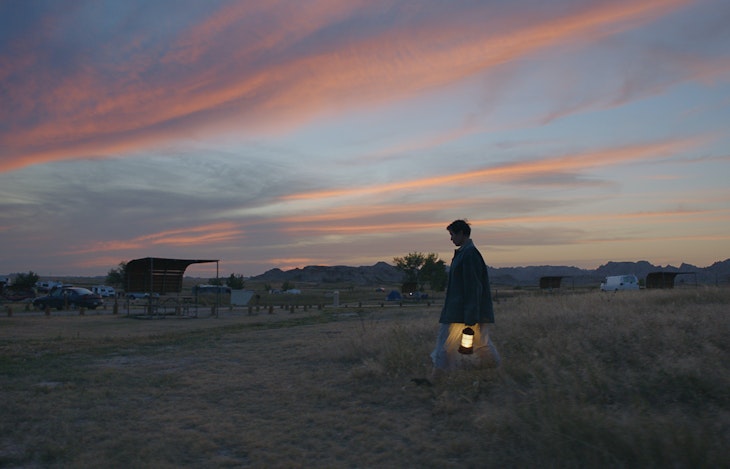Young Critics review: Nomadland #1

What is in its core a simple reiteration of the constitutive idea of the classic Western, the age- old tension between individual and collective interests, comes off on the screen as a layered and fresh meditation on life. Chloé Zhao knows how to make a conventional narrative—a modern tale of an American cowgirl—feel unconventional through docufictional narration. Consequently, she uses this strategy as an at times valid excuse to evade critical side notes on the complex themes she addresses. (How to justify wealth in an unfair economic system? How to rid yourself of the pain of capitalism? How to deal with the grief of losing a loved one?) The effect is that Nomadland stubbornly ignores to talk politics, even less ideology, all the while treading on politically and especially ideologically charged grounds.
“Fern is part of an American tradition,” says Dolly (Melissa Smith), sister of main character Fern (Frances McDormand). Nomadland is based on a 2017 non-fiction book by Jessica Bruder that carries the same title, which documents the modern nomad in the United States in the wake of the Great Recession in 2008. Like its literary source, Nomadland favours intimate storytelling over shocking statistics. With her apt performance, Frances McDormand—who also produced the film—carefully provides a common space in which all of the other characters, portrayed by non-professional actors, can comfortably meet. The audience meets Fern after the worst has happened: the village of Empire is rendered obsolete when the sheetrock plant in Nevada it is built next to shuts down. Fern packs up her stuff in her trusted van, Vanguard, and trades her beloved home—now ghost town—for an icy desert landscape.
We follow her as she drives into the capitalist post-apocalypse, going from job to ever more humiliating job, meeting fellow (real) nomads on the road. Admittedly, it’s tricky to centralize a single actor when there is an overabundance of authenticity—straight from the source—in the remaining characters, who simply play themselves, but Zhao and McDormand never turn their backs. The stories of Swankie and Linda, two veteran nomads who guide Fern and teach her the dos and don’ts of the lifestyle, are monumental, yet fragile. Fern truthfully takes the position of the outsider, never fully comfortable with line dancing in a godforsaken pub and upset when someone who is helping her optimize the space in her van breaks her precious tableware. Zhao avoids blunt judgements with the utmost caution, using McDormand as lubricant, easing the slide into the underbelly of American society.
This underbelly is depicted with extreme vigilance. Yes, the bad within the nomad community is not completely shied away from: there is a certain shame and degradation present when Fern shits in a bucket or goes into another day of work for Amazon. Yet the good is plainly favoured and certain elements of the nomad lifestyle—most notably the idea of reconnection with nature—are romanticized with the help of a seemingly floating camera, capturing dreamy images bathed in golden light, as when the nomads watch a sublime sunset à la Albert Bierstadt. Other, more equivocal traits of the nomad lifestyle—such as the lack of responsibility towards family or the inability to be released from the grief of losing a loved one—are similarly treated. “Freedom is not free,” states a billboard Fern drives past.
Thrice Fern is offered a home to settle: first by a friend, then by a sister, finally by a lover. As Fern drives alongside the endless American West the radio reports on the aggressive behaviour of polar bears in captivity. Philospher Rosi Braidotti said that “[e]mpathy and compassion are key features of this nomadic yearning for in-depth transformation.” Add this to Fern’s assertion that she is not “homeless, just houseless,” and there appears a subtle suggestion that maybe we should let her go, despite our reservations—could they be prejudices?—about her newfound self-sufficient ways. The point being made in Nomadland is ultimately an unsurprising one, which is not to say an unimportant one. Fern admits to an inability, rather than an unwillingness to return to a former way of being. Similar to this, Zhao is unable to give us the unforeseen ending—a reconciliation, resurrection or coming home of sorts. Some habits in North American mythology are too hard to break. There can be no final goodbye.